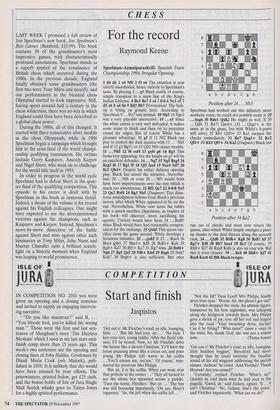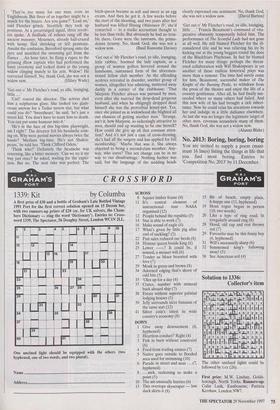ISLE OF
iSINGLE MALT 5 010'11 wrflISX1 . .
COMPETITION
ISLE OF
u RA
SINGLE MALT SCOTCH %ASV
Start and finish
Jaspistos
IN COMPETITION NO. 2010 you were given an opening and a closing sentence and invited to supply an engaging interven- ing narrative.
"Do you like macaroni?" said R. . . . "You bloody fool, you've killed the wrong man."' Those were the first and last sen- tences of Maugham's story 'The Hairless Mexican' which I used in my last start-and- finish comp more than 15 years ago. This week's two sentences are the opening and closing lines of John Halifax, Gentleman by Dinah Maria Craik (née Mulock), pub- lished in 1856. It is unlikely that she would have been amused by your efforts. The prizewinners, printed below, get £25 each, and the bonus bottle of Isle of Jura Single Malt Scotch whisky goes to Tanya Jones for a highly spirited performance.
`Get out o' Mr Fletcher's road, ye idle, lounging, little ... "But Mr McCrory, sir ... "No buts. I ken your sort, young laddie. After the floral trib- utes, I'll be bound. Now, let Mr Fletcher drive the hearse like a decent Christian. Ye'll have the horse prancing about like a circus act, and poor young Mr Philips still warm in his coffin ...You'll excuse me, ma'am.' Of course,' mur- mured the prostrate Mrs Philips.
`But sir, it is the coffin. When you went over that pothole at the corner ... ' They all turned to see the ebony box sprawled across a puddle. `Turn the horse, Fletcher.' But sir ... ' The boy was still bouncing impatiently. 'Oh aye. Here's tuppence: `Sir, the jolt when the coffin fell ... '
`Not the lid? Dear Lord! Mrs Philips, kindly avert your eyes."Worse. Sir, the ghost's got out!'
Fletcher dropped the reins. An athletic figure, hampered by his best nightshirt, was lolloping along the hedgerow towards them. Mrs Philips gave a shriek of joy, tore off her veil and leaped into the road. 'Your mourning dress, ma'am! Can it be fitting?' Who cares?' came a voice in the wind. No, thank God, she was not a widow now. (Tanya Jones) `Get out o' Mr Fletcher's road, ye idle, lounging, little heathen beggars.' Beresford had never thought that he could welcome the familiar sound of his old sergeant addressing the pariah classes. 'Judson!' he cried. 'And Fletcher! Thank Heaven! Are you armed?'
`Certainly,' replied Fletcher. 'What's up?' Quickly he told them what he had seen in the pagoda. `Gawd, sir,' said Judson, aghast. 'It ... it ain't Christian."No, Judson, that's the point, said Fletcher impatiently. 'What can we do?'
`They're too many for one man, even an Englishman. But three of us together might be a match for the brutes. Are you game?' Lead on,' said Fletcher grimly. Stealthily they took up positions. At a prearranged signal, three revolv- ers spoke. A fusillade of echoes rang off the ancient masonry. Mourners, already half-crazed with hemp, fled shrieking or fell prostrate. Amidst the confusion, Beresford sprang onto the pyre and snatched the swooning girl from the flames ... An hour later, he flung a rupee to the grinning dhow captain who had performed the hasty ceremony and looked down at the young widow clinging mutely to his arm. Widow? He corrected himself. No, thank God, she was not a widow now. (Hilary Wade) 'Get out o' Mr Fletcher's road, ye idle, lounging, little ...'
'Cut!' roared the director. The actress shot him a sulphurous glare. She looked too glam- orous anyway for a Tudor tavern slut, but what could you do? 'Sweetheart,' he said, 'he's just a street kid. You don't have to scare him to death. You can put some humour into it.' 'He's in the face of this big-time playwright, am I right?' The director felt his headache com- ing on. Why were period movies always twice the hassle? 'Medium big-time. He's not Shakes- peare,' he told her. 'Think Clifford Odets.'
`Think who?' Definitely the headache was returning, like a bitter memory. 'Can we try it my way just once? he asked, waiting for the explo- sion. But no. The next take was perfect. The bitch-queen became as soft and sweet as an egg cream. And then he got it. A few weeks before the start of the shooting, and two years after her husband was killed filming Obliterator IV, she'd remarried — to a studio accountant thought to be less than virile. But obviously he had no trou- ble there. Gone were the tantrums, the prima- donna tyranny. No, thank God, she was not a widow now. (Basil Ransome Davies) `Get out o' Mr Fletcher's road, ye idle, lounging, little rabbits,' boomed the lady captain, as a group of women golfers hovered around the handsome, suntanned form of the aforemen- tioned fellow club member. As the offending acolytes retreated in disorder, another group of women, altogether less admiring, muttered away darkly in a corner of the clubhouse: 'That Marjorie Fletcher always was pursued by men, even after she married the drop-dead gorgeous husband, and when he obligingly dropped dead himself she was the proverbial honey-pot. Yes, once she joined us in widowhood she blighted all our chances of getting another man."Strange, isn't it, how Marjorie, so sickeningly attractive to men, should end up wanting to be one herself? How could she give up all that constant atten- tion? And it's not just a case of cross-dressing, she's had all the surgery and has applied for full membership.' Maybe that was it. She always objected to being a second-class member. Any- way, who cares? This sex change can be in no way to our disadvantage.' Nothing further was said, but the language of the nodding heads clearly expressed one sentiment: No, thank God, she was not a widow now. (David Barton) `Get out o' Mr Fletcher's road, ye idle, lounging, little ...' Francis Beaumont's command of vitu- perative obscenity temporarily failed him. The performance of The Scornful Lady had not gone at all well. He still blamed Fletcher for the ill- considered title and he was relieving his ire by kicking out at the young beggars round the door of the Blackfriars Playhouse. In fact he blamed Fletcher for many things: perhaps the threat- ened collaboration with Will Shakespeare in yet another of those endless historical plays was more than a rumour. The time had surely come for him, Beaumont, successful maker of The Knight of the Burning Pestle, to withdraw from the press of the theatre and enjoy the life of a country gentleman. After all, he had finally suc- ceeded where so many others had failed. And this new wife of his had brought a rich inheri- tance. Now he could relax his attentions towards her and indulge in a little dalliance elsewhere. At last she was no longer the legitimate target of other men, covetous scoundrels many of them. No, thank God, she was not a widow now.
(Alanna Blake)



















































































 Previous page
Previous page